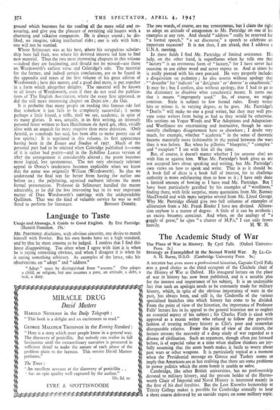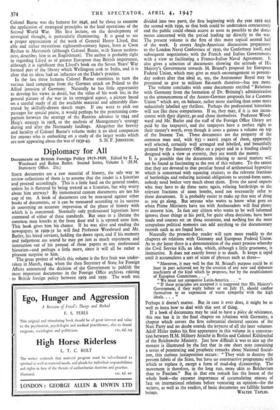The Academic Study of War
A sounau but even more a professional historian, Captain Cyril Falls "vas a good choice as the third occupant of the Chichele chair of the History of War at Oxford. His inaugural lecture on the place of war in history has now been published, and is a notable plea for the interest and importance of his subject.. It is an undeniable fact that such an apologia needs to be constantly made for military history, which, in spite of the obvious importance of wars in the past, has always been, and still is, the Cinderella of the various specialised branches into which history has come to be divided. From the point of view of the historian, the importance of Professor Falls' lecture lies in its appeal to the general historian not to neglect an essential aspect of his subject ; Sir Charles Firth is cited with approval as a recent writer who refused to follow the prevalent fashion of treating military history as Clio's poor and somewhat disreputable relative. Front the point of view of the citizen, the lecture stresses the necessity of a deep study of war regarded as a disease of civilisation. Such an argument, though often put forward before, is of especial value at a time when shallow thinkers are joy- fully assuming that the atom bomb makes it futile to worry about past wars or other weapons. It is particularly topical at a moment when the Presidential message on Greece and Turkey seems to imply that Americans are at last realising that there are some problems in power politics which the atom bomb is unable to solve. Cambridge, like other British universities, has no professorship devoted to military history, and the present holder of the Harms- worth Chair of Imperial and Naval History is interested mainly in the first of his dual loyalties. But the Lees Knowles lectureship at Trinity College makes it possible for Cambridge annually to hear a short course delivered by an outside expert on some military topic.
Colonel Burne was the lecturer for 1946, and he chose to examine the application of strategical principles to the land operations of the Second World War. His first lecture, on the development of strategical thought, is particularly illuminating. It is good to see • proper appreciation of the work of General Henry Lloyd, that able and rather mysterious eighteenth-century figure, born at• Cwm Bychan in Merioneth (although Colonel Burne, w:th Saxon tactless- ness, describes him as an Englishman). The author is probably right in regarding Lloyd as of greater European than British importance, although it is significant that Lloyd's book on the Seven Years' War formed part of the library which Wellington took to India, and it is clear that its ideas had an influence on the Duke's practice.
In the last three lectures Colonel Burne examines in turn the various land campaigns from the German attack on Poland to the Allied invasion of Germany. Naturally he has little opportunity to develop his views in detail, but the value of his work lies in the general picture of the war in its strategical aspect, a picture based on a careful study of all the available material and admirably illus- trated by skilfully-drawn sketch maps. If one were to pick out passages for special praise, it would perhaps be the penetrating com- parison between the strategy of the Russian advance in 1944 and Haig's strategy in 1918, or the analysis of Montgomery's strategy during and after the Normandy landings. Altogether the brevity and lucidity of Colonel Burne' i volurhe make it an ideal companion for anyone who is embarking on a study of the larger works which are now appearing about the war of 1939-45. S. H. F. JoHNsrox.



































 Previous page
Previous page